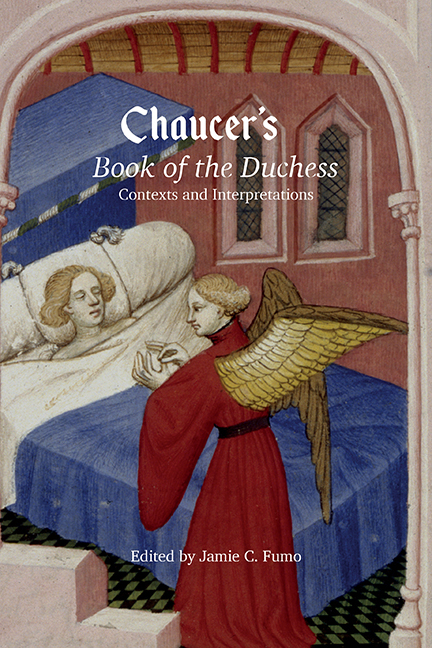Book contents
- Frontmatter
- Contents
- List of Illustrations
- Acknowledgments
- List of Contributors
- Abbreviations and Editions
- Introduction: Reopening the Book of the Duchess
- I Books and Bodies
- 1 Codicology, Text, and the Book of the Duchess
- 2 Idleness, Chess, and Tables: Recuperating Fables in Chaucer's Book of the Duchess
- 3 ‘Noon other werke’: The Work of Sleep in Chaucer's Book of the Duchess
- 4 Discovering Woe: The Translation of Affect in Chaucer's Book of the Duchess and Spenser's Daphnaïda
- II The Intertextual Duchess
- Bibliography
- Index
- Miscellaneous Endmatter
4 - Discovering Woe: The Translation of Affect in Chaucer's Book of the Duchess and Spenser's Daphnaïda
from I - Books and Bodies
Published online by Cambridge University Press: 18 April 2018
- Frontmatter
- Contents
- List of Illustrations
- Acknowledgments
- List of Contributors
- Abbreviations and Editions
- Introduction: Reopening the Book of the Duchess
- I Books and Bodies
- 1 Codicology, Text, and the Book of the Duchess
- 2 Idleness, Chess, and Tables: Recuperating Fables in Chaucer's Book of the Duchess
- 3 ‘Noon other werke’: The Work of Sleep in Chaucer's Book of the Duchess
- 4 Discovering Woe: The Translation of Affect in Chaucer's Book of the Duchess and Spenser's Daphnaïda
- II The Intertextual Duchess
- Bibliography
- Index
- Miscellaneous Endmatter
Summary
Prologue: Ovid's Metamorphoses and the Transformation of Grief
When Ovid's Alcyone dreams of her dead husband, Ceyx (who is in fact Morpheus in disguise, sent by Juno to relieve the queen's anguished uncertainty about his fate at sea), she awakens in distress, roused by the sound of her own voice (‘uoce sua … turbata’, Met. 11.677). Interestingly, Alcyone's voice straddles both dream and reality; she really does speak, but she is speaking to someone, in her dream, who isn't ‘really’ there. Her voice attempts a poignant translation – from dream to waking – that it cannot complete. The episode beautifully illustrates the dream's work as a kind of transitional space for Alcyone, representing her husband, one last time, in the act of telling her that he isn't there. Once shaken out of sleep into reality, Alcyone begins the process of accommodating her husband's death. But in this bereft waking world her own voice now rapidly ceases to be able to articulate her emotions, and we are told that wailing took the place of words as she absorbs her loss (‘uerboque interuenit omni / plangor’, 11.708–9).
The dream seems to pave the way for what happens next: a sighting of the dead body itself, which washes ashore in front of her and elicits an immediate deictic recognition: ‘ille est!’ (11.725). But this direct confrontation with the body of Ceyx – the real body, it appears, not the phantom shape conjured by Morpheus – precipitates a final cutting off of her ability to speak, and she metamorphoses into a bird characterized precisely by its plangent, though of course speechless, cries (11.734–5). Because the appearance of the body of Ceyx is not part of Morpheus's plan, it seems to result at least in part from the psychological process set in motion by the dream and partially articulated in Alcyone's grief-stricken cries. The appearance of the body marks a forward movement in her understanding of her husband's death. But the metamorphosis suggests that the process of accommodation – what Freud will call the work of mourning – stalls precisely at the vision of the corpse. As the bird Alcyone becomes a figure for an inarticulate sorrow that will never develop into a more psychologically integrated form. Her affective state – sorrow – has literally taken over her body.
- Type
- Chapter
- Information
- Chaucer's Book of the Duchess , pp. 71 - 94Publisher: Boydell & BrewerPrint publication year: 2018



